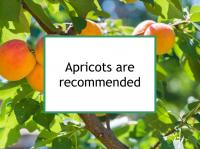Apricots (Prunus armeniaca) are rich source of vitamin A through its relatively high beta-carotene content. Apricot chemopreventive compounds include carotenoids such as beta-carotene and some lycopene, in addition to chlorogenic acid, several procyanidins and anthocyanins, and hydroxycinnamic acid derivatives.
Breast cancer-related effects of eating apricots
The high carotenoid levels found in apricots suggest that consuming this fruit could serve to protect against breast cancer. However, no population studies have been performed that directly assess the association between consuming apricots and the risk of breast cancer.
Beta-carotene accounts for the majority of the carotenoid content of apricots, depending on the cultivar and growing conditions. Deeply orange colored flesh (less likely to be found in apricots that are picked before ripening) has the greatest carotenoid content.
Women with substantial dietary intake of carotenoids such as beta-carotene have been reported to have lower risks of breast cancer and its recurrence than those with low intake, although not all studies are in agreement.
A Scandinavian study found that dietary (but not supplemental) beta-carotene had a protective effect against lobular breast cancer in postmenopausal women. Another European study reported that high intake of beta-carotene was protective against breast cancer in postmenopausal women using hormone replacement therapy (HRT). The same study also found that dietary beta-carotene was associated with lowered risk of breast cancer in postmenopausal women with relatively high alcohol consumption. In addition, treatment with beta-carotene has been shown to reduce cardiotoxicity induced by the chemotherapy drug cisplatin in rats.
Additional comments
Non-organic apricots must be washed very thoroughly to remove pesticide residue. Most U.S. apricots are grown in California and Washington state. However, the U.S. imports significant amounts of dried apricots from Turkey and fresh apricots from Chile. One 2008 study found significant levels of lead and cadmium in dried apricot samples from Turkey. Dried apricots typically are dried in a process using sulfur dioxide, which helps preserve their color but can trigger asthma in some people. One study found that dried apricots contained levels of pesticide residue ranging between half the levels of fresh apricots and equal levels. We recommend purchasing U.S. organic apricots.
The Japanese apricot tree (Prunus mume), also known as Chinese plum, has bitter fruit and is primarily grown for ornamental purposes, particularly for its late winter bloom of pink flowers. The flowers (often referred to as plum blossoms) are a favorite subject of traditional Japanese and Chinese paintings. An anti-carcinogenic compound referred to as MK615 has been isolated from this apricot by Japanese researchers. MK615 has been found to inhibit the growth of human pancreatic, liver, colon and breast cancer cells.
Laetrile is not an effective cancer treatment
Laetrile, a synthetic form of amygdalin (found in bitter almonds and apricot kernels), has long been used as an alternative cancer treatment, although it is less popular now than in the 1970s and early 1980s when numerous laetrile clinics in Tijuana, Mexico were established to meet the demand from U.S. cancer patients. The claim that laetrile is an effective and benign cancer treatment is not supported by sound clinical data. Laetrile has been found ineffective in shrinking tumors, increasing survival time, and alleviating cancer symptoms. Although sometimes referred to as vitamin B17, laetrile is not a vitamin. Some cases of acute accidental cyanide poisoning have been reported with the use of laetrile in combination with vitamin C. Vitamin C is known to increase the conversion of amygdalin to cyanide and reduce body stores of cysteine, which is used to detoxify cyanide. Ingesting apricot kernels or apricot seeds can also result in cyanide toxicity and should be avoided. Persipan, a marzipan-like confection made with ground apricot or peach kernels also is not recommended.
Sources of information provided in this webpage
The information above, which is updated continually as new research becomes available, has been developed based solely on the results of academic studies. Clicking on any of the underlined terms will take you to its tag or webpage, which contain more extensive information.
Below are links to recent studies concerning this food and its components. For a more complete list of studies, please click on apricot.
